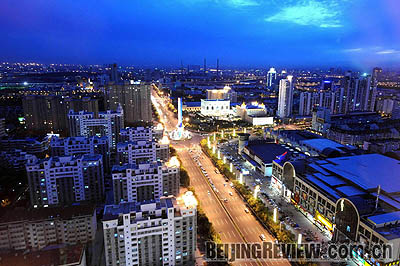|

The second annual Summer Davos in China took place at the end of September amid global panic over the credit crunch on Wall Street. The unprecedented financial turmoil dominated the discussions of the roughly 1,400 attendees from nearly 90 countries and regions, despite the innumerable panel discussions and closed-door sessions based on the forum's theme "The Next Wave of Growth."
The Wall Street meltdown that began with the collapse of Lehman Brothers Holdings Inc. has spread to other large financial institutions both in the United States and other places. On October 3, the U.S. House of Representatives passed a sweetened version of a $700-billion economic bailout package for the country-a financial relief plan to buy bad mortgage-related securities and other devalued assets from troubled banks and other institutions.
But the most expensive government intervention in history failed to save the stock market from sinking. After a big rally of more than 300 points earlier that day, the Dow Jones Industrial Average ended the volatile week down 157 points at 10,325.38.
The round-the-world share sales slammed markets in the United States, Japan, and Asian and Latin American countries. Some European bourses saw record declines on October 6 when panicked investors feared the bank bailout would fail to end a crippling credit crisis. Overall, the markets have started regarding the rescue plan as a remedy for what's ailing the financial system, but not a cure-all.
"At this moment, confidence is even more precious than gold or any currencies," Chinese Premier Wen Jiabao said during a brief question-and-answer session that followed his speech at the forum's opening ceremony in the port city of Tianjin on September 27. He emphasized international cooperation as well as confidence was needed on the parts of economists, entrepreneurs, the public and state leaders to pull through the financial crisis.
The impact
"We are in a period of tremendous lack of confidence which is impacting credit markets worldwide and until you restore that, we have a problem worldwide," said William Rhodes, Senior Vice Chairman of Citigroup Inc. and President and CEO of Citicorp Holdings Inc., at the session on "Global Growth at Risk" on September 27. The unfolding financial crisis, the worst since the Great Depression, was now affecting the real economy, with lending at a trickle, unemployment rising and retail sales falling, he said.
Stephen Roach, Chairman of Morgan Stanley Asia, agreed with Rhodes.
"The American consumer is toast, done, finished," said Roach, adding that the crisis would have far-reaching consequences for countries trying to export goods to the United States.
The costs of the crisis will be felt by all countries, including China through changing stock market sentiment, falling inward investment and a fall in export demand tied to falling consumer spending in Europe and the United States, EU trade commissioner Peter Mandelson said on the evening of September 26.
Liu Mingkang, Chairman of the China Banking Regulatory Commission, told participants that the Chinese economy is "quite okay," though its growth may come down from 11 percent to 9 percent in the coming years. "This is good for China. China doesn't need speed first; China needs quality first," he said.
Fred Zuliu Hu, Chairman of Greater China, Goldman Sachs (Asia), said at a different session on September 26 that the global credit turmoil would not have a major impact on China's financial sector, because Chinese lenders had limited exposure to risks.
"The global economic recession will not occur, especially in emerging markets in Asia-Pacific areas such as China, where it keeps building up infrastructure and developing a consumer-based economy that is not so much relying on exports," said James Quigley, CEO of audit and accounting firm Deloitte Touche Tohmatsu, on the same day.
Yet, some speakers at the forum said it would be difficult for company leaders to adequately assess risks in the business environment.
"It is not easy to see the risks, not easy to manage them," Fu Chengyu, Chairman and CEO of China National Offshore Oil Corp. (CNOOC) said. "The price of oil is closely related to the performance of the U.S. dollar, but it is difficult to predict where the greenback will be in six months."
Solutions
Mandelson pointed out that the current financial crisis has reinforced the need to create a global dialogue and framework on financial globalization and investment that extends beyond the developed world and takes into account the rising powers of the emerging world. He also called for new mechanisms to strengthen the International Monetary Fund's function as an early warning system for financial instability.
| 